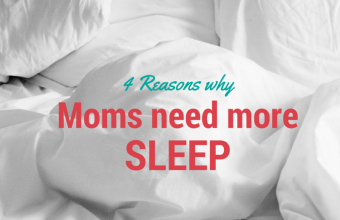Your head hits the pillow, you pull up the blankets, snuggle into the warmth, and start to drift off when your eyes pop open. Was that the baby? A few moments of silence and you close your eyes, sure you were imagining it, when the thin, high cry of your baby sounds out in the darkness.
You are tired. Bone-deep exhaustion. You are sure this cannot be normal, but everyone assures you that it is. As you throw back the covers and wearily clamber out of bed, shivering, you wish for the good ol’ days of all-nighters for school—somehow they weren’t quite this exhausting!
So why is getting up with a new baby so much harder? Well, to start, you don’t just have to take care of yourself anymore. You need to be present and aware enough to look after a small person. And you aren’t just staying up for one or a few nights to get through midterms, you are waking up multiple times in a night, over and over again. This causes your sleep cycles to be disrupted. For many, disrupted sleep is harder than no sleep at all. And finally, you likely just had a baby! Your body has healing to do, and sleep is a vital part of the healing process.
So what can you do?
Go back to bed
The advice ‘sleep when the baby sleeps’ doesn’t work for most families. After all, most adults are not used to sleeping in the middle of the afternoon. The better method is to keep going back to bed until you get 6-8 hours of sleep in total. That means don’t get out of your pajamas or put your contacts in. Don’t start a load of laundry because, hey, you’re up. Just keep getting back under those covers. While not quite as good as eight straight, you will feel a little more human having gotten enough hours of sleep in total.
Ask for help
Get yourself some help! Whether a family member, a friend, or a postpartum doula, knowing someone is there if your baby needs anything can help you to relax enough to actually sleep when you are in your bed. All too often, new parents can lie awake, wondering when their baby will wake next. With the help of the people around you, you can sleep knowing that your child will be taken care of even if you are sleeping.
Consider having a partner take all of the feeds, one night a week. Whether they give a bottle of pumped milk or formula, getting a full nights sleep, even just once a week, can feel like a week at a spa when you are exhausted. If you are breastfeeding, you may need to wake up to pump during the night, but that is much shorter a sleep interruption than feeding a baby, and it will be on your natural sleep cycle rather than your baby’s.
Figure out what works
Use the tools available to you. Whether you use a swaddle, pacifier, vibration, white noise, or every tool in the tool box, helping your baby to sleep for longer stretches will help you sleep for longer stretches too. Establishing healthy sleep habits from the beginning will help the whole family sleep better. Always check with your child’s physician to see if sleeping longer stretches is safe for their age and weight.
Take care of yourself
Lastly, be gentle with yourself. It is healthy to ensure your own needs are met, and sleep is a need. Sleep deprivation can contribute to postpartum depression and anxiety, make driving less safe, and even contribute to other health ailments such as cardiovascular stress. It is important to get adequate rest, even if that means letting the dishes go or cancelling plans.
Sleep deprivation and exhaustion can be the mark of a ‘good parent’ in some circles, but the best parent is one who enjoys parenthood. Being exhausted all of the time is not healthy for anyone. By taking care of your own needs, you are also helping to meet the needs of your child.
Tagged under: sleep,postpartum,new baby,sleep-deprivation,sleep tips,new parent,baby sleep tips
Category: wellness






